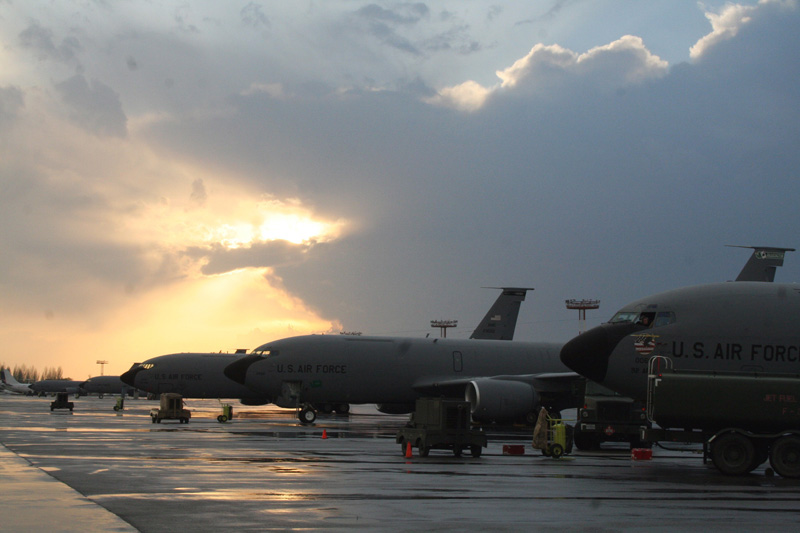
Manas Scheduled to Resume Civilian Status
Publication: Eurasia Daily Monitor Volume: 6 Issue: 81
By:

The military and security authorities in Kyrgyzstan are actively preparing for the planned closure of United States’ air base at Manas in August. Bishkek is also intensifying its efforts to strengthen the Collective Rapid Security Treaty (CSTO) by preparing a battalion to participate within the rapid reaction forces. On April 20 Kyrgyz Security Council Secretary Adahan Madumarov, said that Manas will not be used for military purposes after the withdrawal of the United States’ Air Force has been completed. Not only will the base revert to its former civilian status, but according to Madumarov it will play no future role in the transit of non-lethal supplies to Afghanistan (Interfax, April 20).
On the same day, Madumarov held detailed discussions on the closure of Manas with the CSTO Secretary-General Nikolay Bordyuzha. Following the meeting, Bordyuzha presented a positive interpretation of closing the base and its impact on the security environment. He stressed that it will not affect the overall security situation either in Kyrgyzstan or more generally within the region. "The withdrawal of the Manas air base will not and cannot affect the security situation in Central Asia," Bordyuzha confidently asserted.
He then went on to proffer a Russian revisionist view of the role of the U.S. military in the country, saying it had never "greatly influenced" the security environment. Bordyuzha attempted to minimize the importance of the shift in Kyrgyz foreign and defense policy by linking the transit of military and non-military cargo into Afghanistan in support of the ongoing stabilization efforts there, with recent transit agreements involving Russia, Kazakhstan, Tajikistan and Uzbekistan. The implication in the CSTO Secretary-General’s comments was that the use of Central Asia as a hub for transporting military supplies into Afghanistan is no longer acceptable, either to Russia or its allies (Interfax, April 20).
Paradoxically, in order to ensure that there will be no negative effect on the region as a result of closing Manas, Bordyuzha suggested that Moscow will proceed with the strengthening of the CSTO base at Kant, which is predominantly a base for the Russian Air Force. Despite claiming that the U.S. military presence in the country had not contributed to the improvement of Kyrgyz security, it appears that Moscow will now take steps to enhance its military footprint in the region. "The Russian leadership plans to increase the number of military planes at Kant. This corresponds to the current situation in Central Asia and Afghanistan," Bordyuzha explained. Although he provided no specific detail on the extent of the planned increase in the size of the deployment at Kant, he unequivocally stated that the reinforcement of the base is connected to the creation of the CSTO rapid reaction forces. "The air base is aimed at ensuring air cover for the rapid reaction forces, the main trait of which is air mobility, and it should be stronger qualitatively and quantitatively" Bordyuzha believes (Interfax, Almaty, April 20).
Bordyuzha ruled out the possibility that the CSTO might consider accessing Manas once the Western military withdrawal in completed. During a visit to Dushanbe he said the deployment of additional air force platforms and personnel at Kant, was in response to the deteriorating security situation in Afghanistan, rather than connected with the closure of Manas (www.24.kg, April 24).
On April 25 Kyrgyz President Kurmanbek Bakiyev clarified that the country will seek to improve its cooperation within the CSTO and the SCO in every possible way, as part of its efforts to promote regional security. "We are not going to fight, but to protect ourselves from any encroachment on our country," Bakiyev said (www.24.kg, April 25).
The CSTO Summit in Moscow on June 14 will mark the formal creation of the new rapid reaction forces. However, an informal meeting of the CSTO leaders will be held in late July and early August in Cholpon-Ata on the coast of Lake Issyk-Kul. The purpose of that meeting is to reflect on the changes to the military components of the organization, and it will have huge symbolic importance -staged in close proximity to the Russian Navy’s research and testing facility at Lake Issyk-Kul (www.24.kg, April 21).
Bordyuzha traveled to southern Osh region in order to inspect a battalion in Alay District, which will be included in the composition of the collective rapid reaction force. His fact-finding visit to the base included examining logistical support and the conditions for servicemen. Bordyuzha revealed that the Alay battalion is manned almost exclusively by contract personnel, which appears to be a key criterion for those units earmarked for inclusion in the rapid reaction forces. "These formations will be used to contain conflicts and to ensure the security of states which are part of the [CSTO] organization. In case of need in this region, this battalion will certainly be involved by presidents’ decision and act in accordance with the situation," Bordyuzha confirmed (Kyrgyz Television 1, April 21).
Madumarov indicated that the Kyrgyz MoD is taking very seriously its future participation in this CSTO force structure. The battalion will receive additional training, including access to specialist mountain warfare courses and support will be provided from Russian instructors. Moreover, Bordyuzha and Madumarov also held meetings with law enforcement agencies in Osh region, discussing their close involvement and potential participation in the rapid reaction forces (Kyrgyz Television 1, April 21).
By escalating the level of its military presence within Kyrgyzstan, assisting in training and equipping the Alay battalion, promoting multilateral security organizations rather than mainly bilateral mechanisms, Moscow plans to quietly reassert itself as the security guarantor of Central Asia. But underlying these more obvious foreign policy objectives, there are genuine concerns about Western failure in Afghanistan and the risks this may pose to the region and indirectly its implications for Russia’s security.




